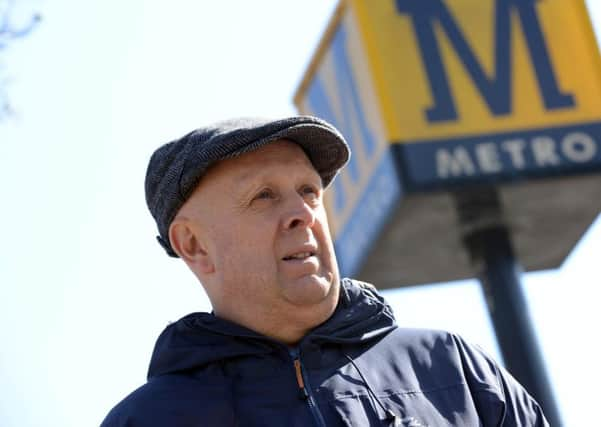Blind South Shields man stranded on Metro after ‘shambolic episode’ sees intercom go down


Peter Bennetts - chairman of the Royal National Institute for the Blind (RNIB) North East - says he had no way of knowing where he was other than by asking fellow travellers for help.
He claims loudspeaker announcements at stations also fell dead, leaving him worried about his whereabouts and safety during his “nightmare” journey home on Monday evening.
Advertisement
Hide AdAdvertisement
Hide Ad

Mr Bennetts, 63, of Beaconside, South Shields, says the system, designed to let the visually impaired know where they are and their next station stop, also partially failed when he made the return journey to Newcastle yesterday.
The dad-of-two is now demanding Nexus apologise, pay him compensation, and give a written assurance it will improve its performance for people with sight issues.
Metro bosses have now promised a full investigation into his claims and will review the frequency of public announcements.
He said: “I was very anxious by what was happening, it takes your independence away. I did not know where I was or even if I was on the right train.
Advertisement
Hide AdAdvertisement
Hide Ad“On my journey, I had to ask three people for help. Luckily, they were all really nice, but that might not have been the case.
“It’s just not right that this kind of shambolic episode can happen to blind people or those who are visually impaired. We should not be put in this situation.”
“I hope Nexus will learn lessons but I’m not at all confident. I’ve had numerous experiences like this before despite legislation which compels businesses and organisations to support the blind and visually impaired.
“There are lots of blind and partially sighted people who use the Metro, and not all are experienced or as outspoken as I am.”
Advertisement
Hide AdAdvertisement
Hide AdThe retired senior education officer says his horror ride started when he went to catch a Metro home at Newcastle Central Station at 6.30pm.
He made his way to the platform after asking a system assistant when the next train was due and being told it was seven minutes away.
Mr Bennetts says no train appeared for 30 minutes, and it was another 10 minutes before one bound for South Shields pulled in.
With no station announcement, he got on after asking for destination confirmation from a fellow commuter.
Advertisement
Hide AdAdvertisement
Hide AdOn arrival at Heworth, he used his mobile to contact Metro control, with another passenger telling him where he was.
He was then able to continue his journey to Pelaw where he swapped trains, cutting his journey short at Chichester and paying for a taxi rather than taking a free bus from South Shields.
Mr Bennetts has been outspoken in his attempts to secure parity in society for the blind or visually impaired.
In around 2004, a lack of information during a Metro journey left him and two other travellers stranded at the system’s overnight depot at South Gosforth, with police being called to help.
Advertisement
Hide AdAdvertisement
Hide AdHuw Lewis, Customer Services Director at Nexus, said: “I’m sorry for the distress that Mr Bennetts suffered on his Metro journey from Newcastle to South Shields.
“Metro services were disrupted on Monday afternoon and evening due to two serious medical emergencies on board trains, while paramedics and our staff helped the people involved.
“This meant trains were held up and did not return to the normal timetable until later in the evening.
“We are reviewing what happened with the on-train and station announcements during Mr Bennetts’ journey.
Advertisement
Hide AdAdvertisement
Hide Ad“We will be looking into the frequency of the announcements and what we did to talk to customers more widely.
“Metro has a proud record of being a fully accessible system for all our passengers. I can assure Mr Bennetts that what went wrong on Monday is being investigated fully.”
Several hundred people in South Tyneside are thought to use support services provided by the RNIB.
Nationally, around two million people are living with sight loss severe enough to have a significant impact on their daily lives, such as not being able to drive.
This is expected to reach 2.7 million by 2030 and to four million by 2050.